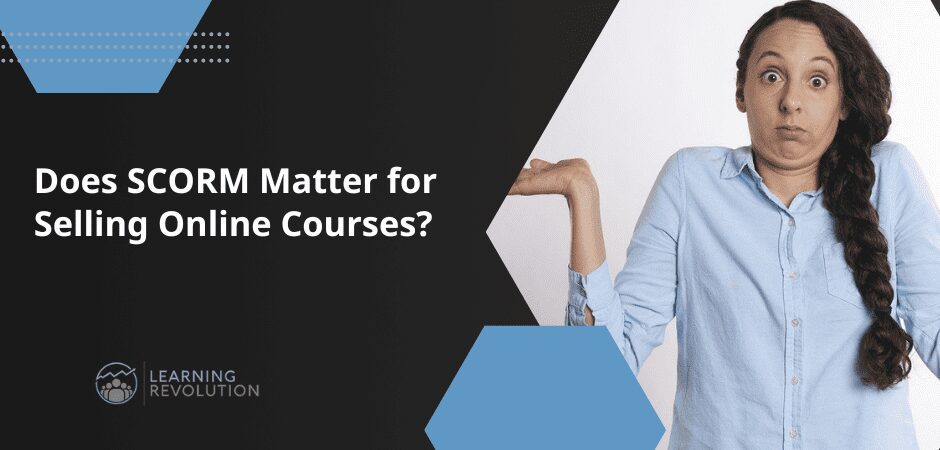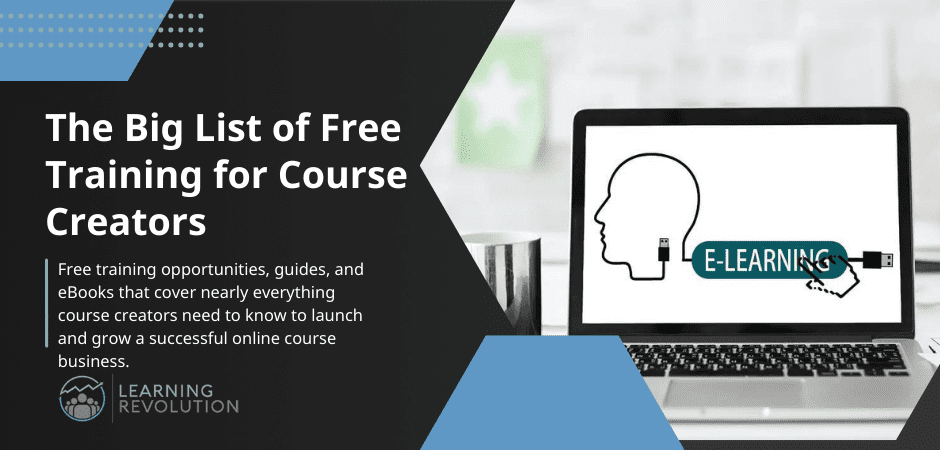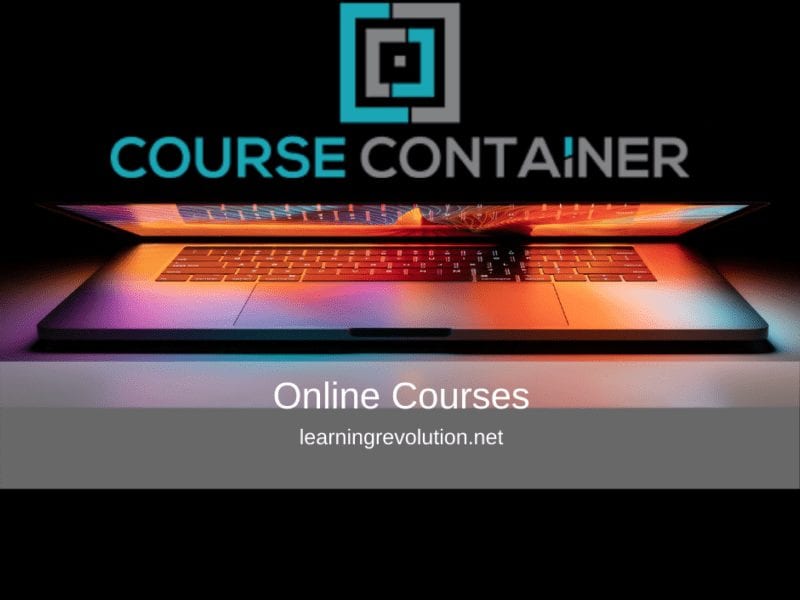
If you are looking for a platform to sell online courses, there is a good chance you will come across the term “SCORM” at some point. But what is SCORM? And, when it comes right down to it, does SCORM matter for selling online courses?
First, What is SCORM?
SCORM, which is an acronym for the Shareable Content Object Reference Model, is the most widely recognized set of technical standards in the e-learning world.
It provides a standardized way for online course content to communicate and interact with a Learning Management System (LMS).
When your content follows SCORM standards, you can easily migrate it to any SCORM-compatible LMS without building your course from scratch.
That’s a big deal for anyone with a high volume of online courses that rely on navigating through hundreds of HTML pages.
SCORM also defines a consistent way to track how students interact with your course content. For example, a course creator might want to know
- Whether a learner has started a particular piece of content
- How much time they spent consuming it
- Whether they completed it and passed or failed
- What’s their assessment score
SCORM does this by providing guidelines on the following aspects of course creation:
Packaging: SCORM defines how to package and structure your course content to easily import, launch, and track within an LMS.
Data Tracking: SCORM specifies how learner data (such as progress, completion status, scores, and interactions) should be communicated between the course content and the LMS.
Navigation: SCORM provides guidelines for how learners should navigate through course content, enabling features like bookmarking and resuming from where they left off.
Compatibility: By adhering to SCORM standards, course creators can ensure that their content will work seamlessly across different SCORM-compliant LMSs, without needing extensive customization or compatibility issues.
LearnWorlds is one of the few platforms in its class that supports SCORM.
Does SCORM Matter And Is It Still Relevant?
Short answer – it depends on your target audience and course creation goals.
Let me explain in more detail.
Scenario #1: When SCORM Compliance Doesn’t Matter
The information that SCORM handles is pretty important. But, it is also information that can be handled in other ways.
For example, many of the online course platforms most popular with solo edupreneurs feature authoring tools that enable you to create course pages within their systems and import video clips and other content elements. These systems usually have proprietary ways of tracking what learners do in a course and providing you with reports. They don’t rely on SCORM packaging, and arguably they give you everything you need without SCORM.
But, here’s the rub – if you take your content out of these systems, it is highly unlikely you will be able to take it into another system and have it play and track in the same way – at least, not without a lot of blood, sweat, and tears.
Scenario #2: When SCORM Packaging Is Important
Creating SCORM content can be critical in the following scenarios.
Migrating Your Course To Another LMS
If you want to be able to migrate your course from Thinkific, Teachable, or any other platform that doesn’t comply with SCORM, you’ll have to build it from scratch.
This is where SCORM packaging can save you a lot blood, sweat, and tears.
You can easily migrate SCORM content to any other LMS without losing your tracking data or critical student information.
Selling to Corporations and Organizations
If your aim is to sell your online courses to businesses or governmental organizations, a large percentage of them are going to have learning management systems (LMSes) that are designed to play and track SCORM-based content, not the stuff that you create in the average $0 to $99-a-month online course platform.
Compliance and Accreditation:
SCORM compliance is often a regulatory requirement in industries such as healthcare, aviation, or finance. If you plan to sell courses to any such industry, follow the SCORM format for content creation.
How To Create SCORM-Compliant Course Content
SCORM has detailed content creation specifications that aren’t easy to understand for a regular non-technical course creator.
So, the best way to create SCORM and HTML5 packages or courses is by using a SCORM authoring tool with a compliant learning management system.
Once you create your course content with a SCORM authoring tool, you can upload it to a complaint LMS. The best SCORM LMS platforms handle all the technical compliance issues in the background.
SCORM Authoring Tools vs. SCORM LMS – What’s The Difference?
You cannot use SCORM authoring tools and SCORM LMS interchangeably.
Here’s how they’re different from each other.
SCORM Authoring Tools
These software tools allow you to create eLearning content following the SCORM guidelines. They provide the right environment to build interactive learning modules like quizzes, presentations, simulations, and assessments and then save it as a SCORM package.
Some of the mainstream SCORM authoring tools include Articulate Storyline, Adobe Captivate, iSpring Suite, Camtasia, and Elucidat.
SCORM Learning Management System (LMS)
These are eLearning platforms that host, deliver, and manage SCORM-compliant content. Once you create your course content using an authoring tool, you’ll use an LMS to deliver it to your students.
Many leading SCORM LMS platforms include authoring features as well. So, if you choose the right tool, you’ll get both functionalities at one price.
It is also possible that an LMS supports content created with specific SCORM authoring tools but cannot create SCORM content itself.
Popular SCORM Compliant Learning Management Systems
Here are some popular SCORM-compliant eLearning platforms you can use for course creation.
- LearnWorlds – Read our review
- iSpring Learn – Read our review
- Talent LMS – Read our review
- New Zenler – Read our review
Does SCORM Compliance Matter For Your eLearning Business?
So, there are definitely situations in which the answer to “Does SCORM matter?” is emphatically “Yes!”
The trick, of course, is you have to decide whether any of these situations apply to you.
If you offer only a handful of courses and they are not particularly complicated – mainly video files and a handful of quizzes, for example – then the upside of using a low-cost, user-friendly system now may far outweigh any future costs or pain associated with moving your content to a different system.
If, on the other hand, you intend to crank out a pretty high volume of courses and they rely on navigating through a significant number of HTML pages, think twice about ignoring SCORM. You don’t want to build out a ton of content now in a proprietary system only to figure out later that you should have built it in a tool that can easily create SCORM-compliant content (like IsEazy, iSpring, Adobe Captivate, or any of the Articulate products).
Similarly, if you really have no plans to sell to corporate or government clients, then worrying about SCORM may add a level of complexity to your business that just doesn’t make sense. But if you see these kinds of clients as integral to your business model, then SCORM does matter.
I suspect most solopreneur subject matter experts do not really need to worry about SCORM – which is why most of the platforms that target this group ignore it – but make that assessment as early in your planning as possible.
Bottom line: SCORM does matter in certain situations. Be clear about whether it matters in yours.
Jeff
*I’ve oversimplified my explanation a fair amount to stay focused on what I think matters most for my readers. If you want to dig into SCORM in more depth, though, I recommend starting with SCORM Explained.
Table of Contents




What about the interactivity which I want?
And which online course platforms do offer SCORM now??
“Interactivity” covers a lot of ground, and doesn’t necessarily have anything to do with SCORM. Happy to comment more if you can provide more detail about what you are looking for. As far as platforms that support SCORM, any of these do: https://www.learningrevolution.net/learning-management-system-for-small-business/ – Jeff
Jeff, Excellent Point. We get a lot of requests from clients who have heard of SCORM and want to know if we support it. In almost 90% of cases, they don’t even need it as you explained in your post above. Some of course do need it but we try and explain something similar to our clients.